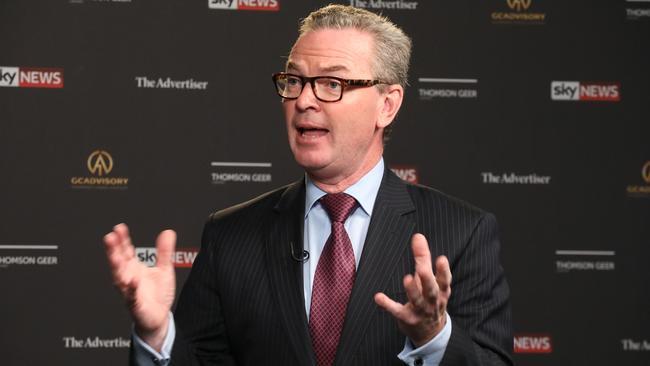Christopher Pyne: Why the land tax reform should pass through parliament
Long-time ally of Premier Steven Marshall, Christopher Pyne was also engaged by property developers to lobby the Government on its land tax changes. So what does he really think?
Opinion
Don't miss out on the headlines from Opinion. Followed categories will be added to My News.
- Developers hire Pyne’s business to lobby Marshall on land tax
- Land tax battle enters final stages
- New outbreak of Liberal unrest over land tax
Major reform to the tax system is never easy at any level of government. But it is often necessary.
It is easily misrepresented because it is a change that requires explanation. There are usually people affected negatively by a change to the status quo who would prefer no change.
The political opponents of the incumbent government almost always act out of self-interest and oppose reform because they assess that seeming chaos is good for their political interests.
You think I’m writing about the current land tax debate in South Australia but I could just as easily be writing about the introduction of the goods and services tax by the Howard government in the late 1990s.

That was a necessary but unpopular reform to address inequities in the tax system that distorted the economy negatively and were a handbrake on growth.
Who seriously argues today that we should go back to a sales tax model on some goods but not others, or higher income and company taxes, or expedient financial transaction and banking taxes with no logic other than to raise revenue?
The GST debate was difficult. The Howard government took it on because it was good policy.
The government of the day prevailed and we are all better off because it stayed true to its course.
The commentators at the time said the government was doomed.
The Labor opposition opposed the policy and fought an election over it.
Only a decade before they had argued for a GST but in opposition they saw their self-interest differently.
The land tax debate in South Australia bears an eerie similarity to the GST debate. The SA Government proposed a reform to land tax in the Budget 20 weeks ago.
Last week they introduced the land tax reform Bill into the House of Assembly.
It is much better than the status quo. It needs to pass both houses of Parliament in order to create a fairer land tax regime than the current arrangements.
It would be “cutting off our nose to spite our face” for it now to be defeated.
The Government has undertaken two rounds of consultation over a 19-week period.
That’s had the unfortunate consequence of dragging out the debate but it’s had the upside of producing a much better reform that lowers tax for a large number of taxpayers and ensures there is a more accurate estimate for what the revenue numbers are for the SA treasury.
It also means that everyone has had their say and produced a more competitive land tax system with the other states from what was the most uncompetitive in the nation until now. The pressure is now on the Labor Party to back a reform that they wanted to do themselves when they were in government but didn’t have the political capital to do so.
The pressure is also on the crossbenchers in the Legislative Council like Connie Bonaros, Frank Pangallo and John Darley to recognise that the reform they opposed 20 weeks ago is not the same as what is being offered now and that it is an advance on the status quo.
Many of the Liberal Party’s traditional supporters have been vocal in opposing this reform.
Some have asked, “why not just let sleeping dogs lie”.
But political parties get elected to do things.
Margaret Thatcher once said something along the lines of “I got elected to do something, not be somebody”.
That’s how then prime minister John Howard felt when he took a political risk with the GST.
Steven Marshall and his Treasurer, Rob Lucas, took a risk by proposing far reaching reform of land tax.
But there is no point in being in government if all you are going to do is hold power without exercising it.
We’ve seen governments like that before in Australia. Bob Carr was the Premier of New South Wales for 10 years but no one can name a single thing he did in an entire decade.
Conversely, Gough Whitlam was prime minister for only three years and, whether or not you like him, or what he did, he is certainly remembered.
The land tax debate will blow over. For those who predict that it has irreparably damaged the Marshall Government I would remind them that the next election is in two and a half years.
There are going to be many more ups than downs for the Government in that time.
I’d also remind those purveyors of doom that only a matter of months before the 2018 SA election, the polls predicted that Nick Xenophon would win a majority of seats in his own right and would be premier of South Australia.
I think we all know how that ended — with a whimper.
As the saying goes, “you can’t make an omelette without breaking an egg”.
That about sums up this debate for the last few months.
By Christmas, most South Australians will be looking forward to lying on one of our superb sandy beaches, listening to my podcasts and this debate will be long forgotten.


